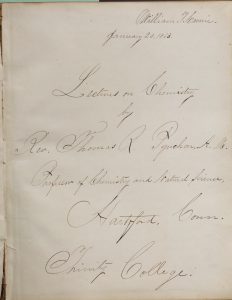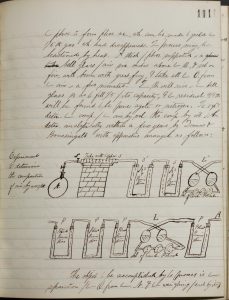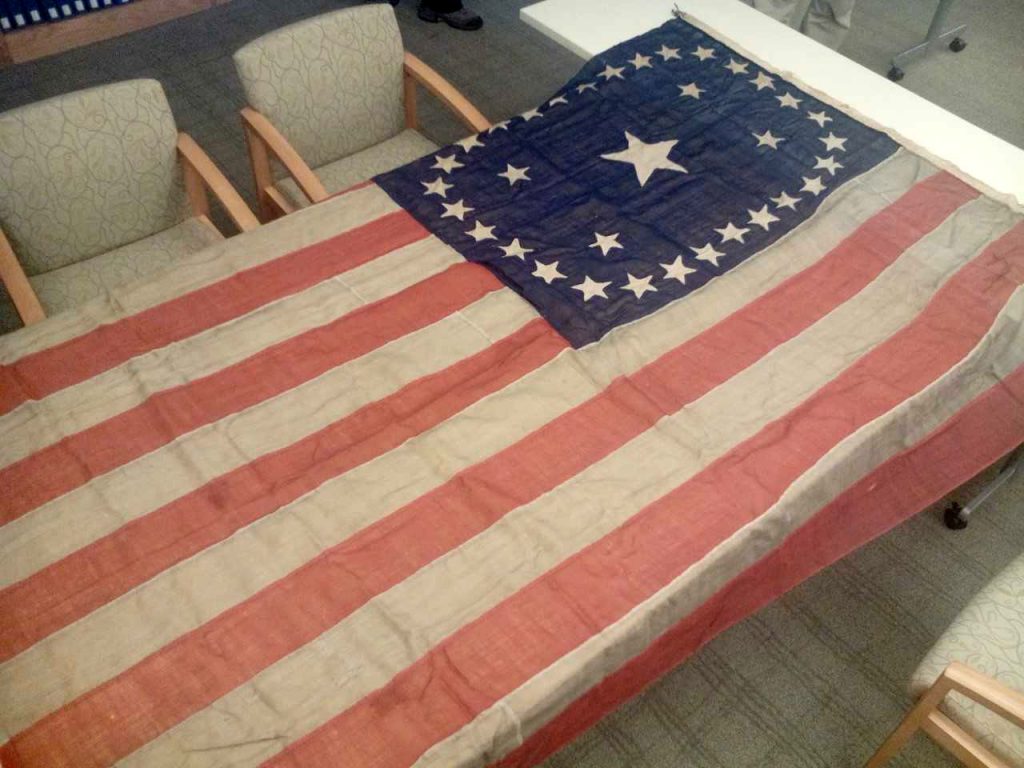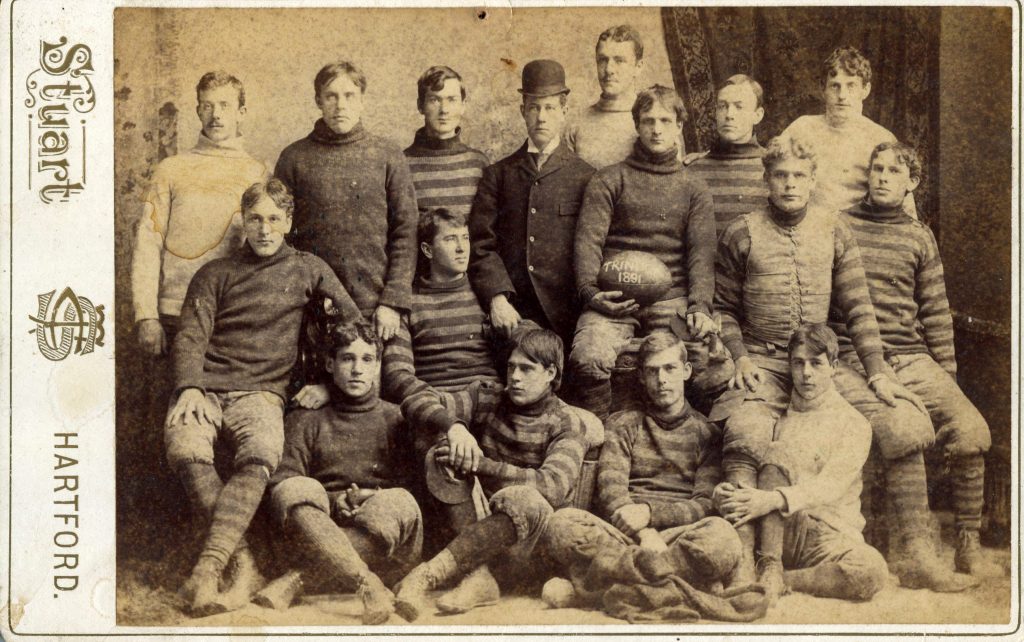 Just acquired for the College Archives from an online estate auction in Pueblo, Colorado–a postcard photo of the 1891 Trinity football team! For those who want to know who is pictured, there is a team photo with names in the 1892 IVY (opposite page 100), which can be found online here, or you can visit the Watkinson to see a physical copy!
Just acquired for the College Archives from an online estate auction in Pueblo, Colorado–a postcard photo of the 1891 Trinity football team! For those who want to know who is pictured, there is a team photo with names in the 1892 IVY (opposite page 100), which can be found online here, or you can visit the Watkinson to see a physical copy!
Archive for the ‘College Archives’ Category
Chemistry Lecture Notebooks
The Trinity College Archives has just acquired two volumes of chemistry lecture notebooks from 1863. These notes were taken by William T. Currie—Class of 1863. The lectures were delivered by Thomas R. Pynchon—Class of 1841. Pynchon was President of the College from 1874-1883 and Scovill Professor of Chemistry and Natural Sciences from 1854-1902. Pynchon also served as College Librarian.
The notebooks are a gift from the Estate of Dr. J. Reilly Lewis.
How cool is this??
Just (re)discovered by archivist Peter Rawson–the flag flown over the College during the Civil War, given back to the College by the great historian Samuel Eliot Morison (1887-1976), whose grandfather, Samuel Eliot (1821-1898) was professor of history and political science (1856-1874) and president of Trinity from 1860-64.
[This post was contributed by Richard Mammana, archivist for the Living Church Foundation, founder and director of Project Canterbury, and a member of the Connecticut Academy of Arts and Sciences]
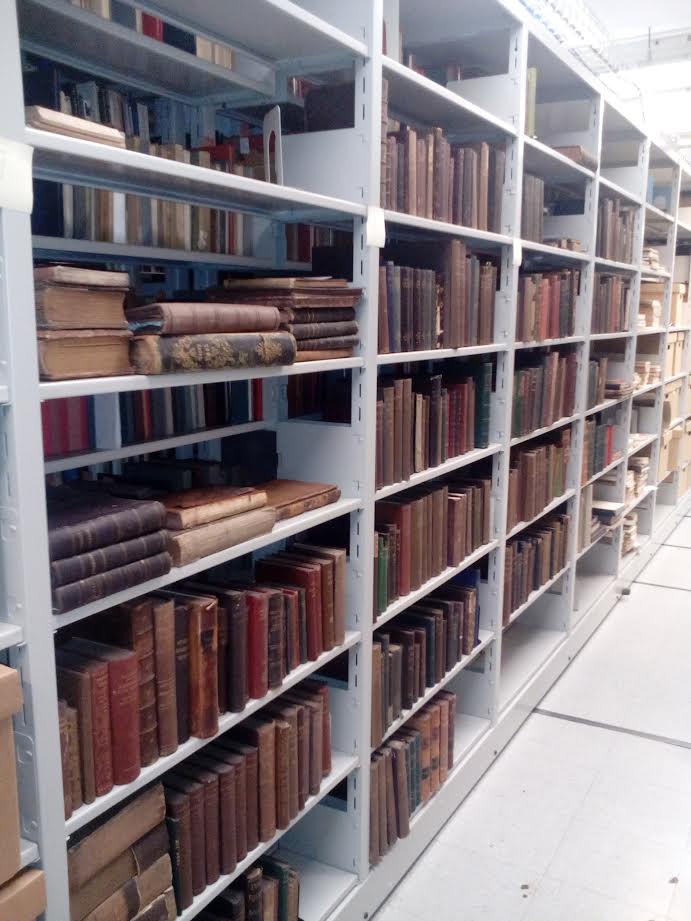 The Watkinson Library at Trinity College recently acquired the intact personal library of Charles Hayden Proctor (January 11, 1850-June 25, 1890). Proctor was a Trinity alumnus (B.A. 1873) who had been graduated from the Episcopal Academy at Cheshire in 1869. He went on to receive his M.A. at Berkeley Divinity School (then in Middletown) in 1876. He was ordained to the diaconate in the Episcopal Church in 1876 by the Bishop of Connecticut, and then to the priesthood in 1877. Proctor had a relatively brief career in the church, dying at 40 after serving in a handful of cures: as a lay missionary in the Naugatuck River Valley; as the founding rector of St. James Church, New Bedford, Massachusetts (1878-1885); at Trinity Church, Pottsville, Pennsylvania (1885-1888); and finally as the third dean of Trinity Cathedral in Little Rock, Arkansas (1888-1890).
The Watkinson Library at Trinity College recently acquired the intact personal library of Charles Hayden Proctor (January 11, 1850-June 25, 1890). Proctor was a Trinity alumnus (B.A. 1873) who had been graduated from the Episcopal Academy at Cheshire in 1869. He went on to receive his M.A. at Berkeley Divinity School (then in Middletown) in 1876. He was ordained to the diaconate in the Episcopal Church in 1876 by the Bishop of Connecticut, and then to the priesthood in 1877. Proctor had a relatively brief career in the church, dying at 40 after serving in a handful of cures: as a lay missionary in the Naugatuck River Valley; as the founding rector of St. James Church, New Bedford, Massachusetts (1878-1885); at Trinity Church, Pottsville, Pennsylvania (1885-1888); and finally as the third dean of Trinity Cathedral in Little Rock, Arkansas (1888-1890).
Proctor’s significance in Trinity history comes from his authorship of The Life of James Williams, Better Known as Professor Jim, for Half a Century Janitor of Trinity College (Hartford: Case, Lockwood and Brainard, 1873), a 79-page biography of the beloved “professor of dust and ashes” of the title—an African American who lived from c.1790 to 1878.
Williams was born to a free American father of African ancestry and a Creole mother in New York. He served as a seaman in the War of 1812, and had arrived in Hartford by 1821 when he was working at the City Hotel. Williams’s association with Trinity began as his domestic service in the household of the college’s founding president Bishop Thomas Church Brownell (1779-1865). As Professor Jim—by then “general factotum” of the college—he made farewell remarks to each graduating class from 1830 to 1874, receiving a gift of money or a valuable object each year, and then serving glasses of punch to the class. (It is from Professor Jim’s use of a lemon squeezer in preparing the punch that the elaborate Trinity traditions about fruit presses have emerged.) Trinity students took up a collection to buy Professor Jim a turkey each year at Christmas for four decades.
Proctor’s Life of James Williams was published by the foremost commercial press in Connecticut at the time, and its wide reach is attested by its presence in the private library of Mark Twain as well as a wide variety of public and academic collections still today.
Proctor’s library is significant in its own right because of its former owner’s work in chronicling an important chapter in Trinity College history. It is also notable for having remained undisturbed in the Proctor family home in Derby for more than 125 years since Proctor died in 1890. The ca. 400 volumes—most with their original owner’s bookplate—provide a fascinating look at the intellectual world of a late nineteenth-century Episcopal priest.
CURATOR’S NOTE: I would like to thank Dan and Denis (of John Bale Books in Waterbury, CT) for alerting me of the existence of this collection and working very hard to deliver it to Trinity College intact. Good booksellers make good libraries!
Football film archive
 The College Archives has taken possession of what turned out to be 33 banker’s boxes of films (mostly fooball) from a storage unit on campus. The earliest films are from the late 1930s, and they seem to go up through the 1980s–games with other colleges, practices, training films, etc. We will be hiring students to produce an inventory, and creating a plan to better preserve and house these films, as well as looking to digitize the more significant footage for the use and enjoyment of our alumni, finances permitting! To facilitate this, we have borrowed a viewer & board to examine the films.
The College Archives has taken possession of what turned out to be 33 banker’s boxes of films (mostly fooball) from a storage unit on campus. The earliest films are from the late 1930s, and they seem to go up through the 1980s–games with other colleges, practices, training films, etc. We will be hiring students to produce an inventory, and creating a plan to better preserve and house these films, as well as looking to digitize the more significant footage for the use and enjoyment of our alumni, finances permitting! To facilitate this, we have borrowed a viewer & board to examine the films.
Reynolds collection pics
[Posted by Peter Rawson, Associate Curator of Archives & MSS]
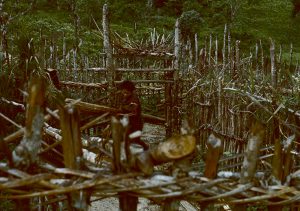 As mentioned in a previous post, we received a rich set of material from Jon Reynolds last fall. Mr. Reynolds has sent us more material over the last year and we are integrating it into the collection. Michelle Sigiel, an archives intern from Simmons College has come across a set of approximately 75 slides depicting Vietnam in 1963. These images give us a fascinating look into the American war in Vietnam.
As mentioned in a previous post, we received a rich set of material from Jon Reynolds last fall. Mr. Reynolds has sent us more material over the last year and we are integrating it into the collection. Michelle Sigiel, an archives intern from Simmons College has come across a set of approximately 75 slides depicting Vietnam in 1963. These images give us a fascinating look into the American war in Vietnam.
Montagnards, also known as “The Degar” are indigenous people of the Central Highlands of Vietnam. Many Degars worked with American Special Forces and were a critical part of the American military effort.
We are in the process of making this collection available for research and plan to complete this phase late this term.
The first two images picture Montagnards. Pic 3 is of a US plane flying over South Vietneam; pic 4 is of South Vietnamese troops; pic 5 is of army helicopters, and the final pic is of Vietnamese children.
Cool physics professor

 A recent gift to the archives is what appears to be an early, self-published “edition” (ca. 1930s) of H. M. Dadourian’s Introduction to Analytic Geometry and the Calculus. We have a copy of a photo-reduced (“Lithoprinted”) typescript, slightly altered and dated 1947, as well as a copy of the 1949 edition published the Ronald Press (New York).
A recent gift to the archives is what appears to be an early, self-published “edition” (ca. 1930s) of H. M. Dadourian’s Introduction to Analytic Geometry and the Calculus. We have a copy of a photo-reduced (“Lithoprinted”) typescript, slightly altered and dated 1947, as well as a copy of the 1949 edition published the Ronald Press (New York).
Dadourian, born in Turkish Armenia in 1878, emigrated to the United States in 1900, took three degrees at Yale and then taught physics there for 10 years, served as an aeronautical engineer at Princeton during WWI and a few years after (1917-23), and was appointed Seabury professor of mathematics and natural philosophy at Trinity College from 1923–1949. He retired in 1949 but remained very active—supporting our intervention during WWII to prevent Germany from conquering Great Britain, and opposing nuclear testing, the development of nuclear weapons, and our involvement in Vietnam. He died in West Hartford in 1974.
“Among his most highly regarded courses at Trinity was one in advanced physics in which classical mechanics were studied by means of the mathematics of the 17th and 18th centuries. The mathematics were used as a tool to understand physical principles which in turn were reduced in large measure to a single principle called The Action Principle. Most of the course was devoted to furthering understanding of this principle by using it to solve problems. The course demonstrated that a great deal could be learned about nature from detailed and general examination of relatively simple problems, and that hypotheses could be proved wrong, although not right, without actual experiments. In his teaching, Dadourian emphasized the importance of stating a problem accurately in terms simple enough to permit mathematical translation.”
[From volume 58 of the National Cyclopedia of American Biography]
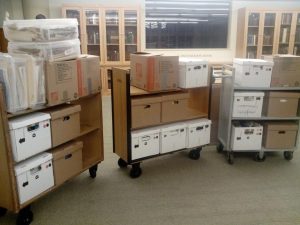 On June 30th Peter Rawson and I drove down to Potomac, MD to pick up a great gift to the Archives–several decades of the professional papers of Ben Bernard Barber ’65, who last year received the Alumni Achievement Award for his book Groundtruth: Work, Play and Conflict in the Third World (2014).
On June 30th Peter Rawson and I drove down to Potomac, MD to pick up a great gift to the Archives–several decades of the professional papers of Ben Bernard Barber ’65, who last year received the Alumni Achievement Award for his book Groundtruth: Work, Play and Conflict in the Third World (2014).
Ben came to Trinity from New York City, joining the fraternity QED, serving as the College’s delegate to the Connecticut Intercollegiate Student Legislature and on the staff of The Trinity Tripod, and was also involved with Hillel and the Political Science Club. He majored in French, and following graduation, his “gap year” turned into 15 years of traveling, writing poetry, and occasionally working as a carpenter throughout India, Asia, Europe, and the United States. He earned a master’s degree in journalism at Boston University, a certificate in French studies from the Sorbonne in Paris, and a certificate in Asian studies as a Gannett Fellow at the University of Hawaii.
He found work as a foreign correspondent for The Observer, USA Today, the Washington Times, and The Christian Science Monitor, among other publications, and later served as State Department bureau chief for the Washington Times and then as a senior writer for the U.S. Agency for International Development, where he reported from Afghanistan, Iraq, Pakistan, Yemen, and Egypt. He continues to write on foreign affairs today as a columnist for The Huffington Post and The American Legion Magazine.
Ben has also taught as an adjunct professor of foreign policy at Georgetown University and George Mason University, and has delivered lectures on foreign affairs at institutions such as the U.S. Naval Academy, the National Defense University, and Johns Hopkins University. For the U.S. Information Agency, he designed and taught seminars for journalists in 10 African countries, and has appeared as a foreign policy expert on several television networks, including CNN, Fox, and BBC.
 In 2014 he published Groundtruth: Work, Play and Conflict in the Third World, a collection of photographs and vignettes about the development of dozens of countries in the Third World, often portrayed in the media as a cliché for poverty, war, and injustice. “For every trouble-making gunman you find in the turbulent corners of the Third World,” he writes, “you find a million decent hardworking men and women raising their children with eyes full of sunshine and hope.”
In 2014 he published Groundtruth: Work, Play and Conflict in the Third World, a collection of photographs and vignettes about the development of dozens of countries in the Third World, often portrayed in the media as a cliché for poverty, war, and injustice. “For every trouble-making gunman you find in the turbulent corners of the Third World,” he writes, “you find a million decent hardworking men and women raising their children with eyes full of sunshine and hope.”
The archive documents his career as a journalist, and comprises electronic files, correspondence, photos, notes and press clippings. It will be processed and available for use by students, faculty and outside researchers as soon as possible.
Coffee for Chemists!
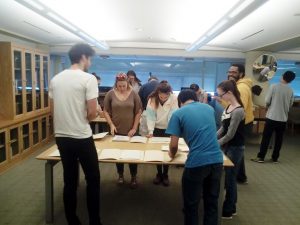 Two days ago we held our second annual summer STEM event–this time focusing on the chemistry students and faculty who work in their labs all summer. On display were some of the 19thC prize essays in chemistry mentioned in the previous post, and half a dozen faculty and almost 30 students came by to delve into this collection, and see what was expected of a Trinity student studying chemistry more than a century ago. Those who broke free from their labs got a voucher for a free coffee at Peter B’s.
Two days ago we held our second annual summer STEM event–this time focusing on the chemistry students and faculty who work in their labs all summer. On display were some of the 19thC prize essays in chemistry mentioned in the previous post, and half a dozen faculty and almost 30 students came by to delve into this collection, and see what was expected of a Trinity student studying chemistry more than a century ago. Those who broke free from their labs got a voucher for a free coffee at Peter B’s.
[Posted by Peter Rawson, Associate Curator of Archives & Manuscripts]
 The Chemical Prize Essay collection in the Trinity College Archives contains 327 chemical essays submitted by students at Trinity between 1858 and 1905.
The Chemical Prize Essay collection in the Trinity College Archives contains 327 chemical essays submitted by students at Trinity between 1858 and 1905.
These essays were submitted as part of a competition among students in to win the first place prize of $30 and the second place prize of $20.
The prize began in 1858 as a contest for seniors and became a junior prize in the mid-1880’s.
Essays were submitted to the Professor of Chemistry. These included Rev. Thomas R. Pynchon, Scoville Professor of Chemistry and Natural Science, 1854-1879; H. Carrington Bolton, Scoville Professor of Chemistry and Natural Science, 1880-1887; Robert B. Riggs (pictured here), Scoville Professor of Chemistry and Natural Science, 1888-1929.
 The assigned essay topic each year was predetermined, with topics concerning chemicals, new technology, plants, light, or the metric system. The essays are organized in alphabetical order of the essayists’ last names, and they include both the winning essays and the other contestants’ essays.
The assigned essay topic each year was predetermined, with topics concerning chemicals, new technology, plants, light, or the metric system. The essays are organized in alphabetical order of the essayists’ last names, and they include both the winning essays and the other contestants’ essays.
